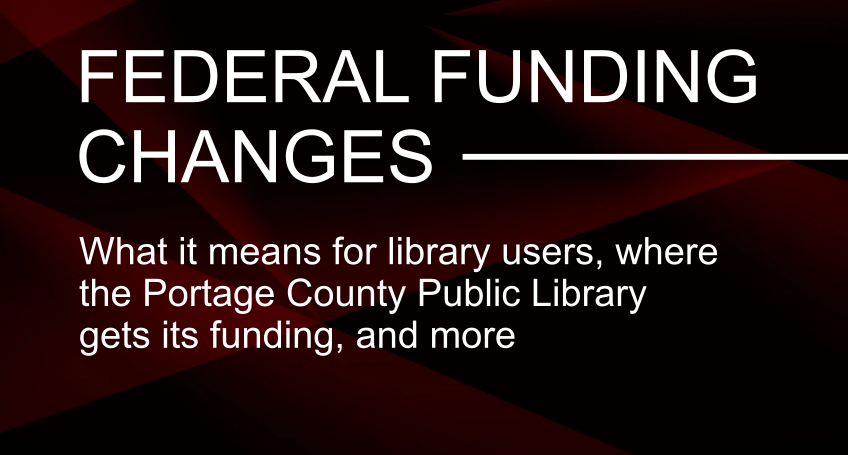Image

Federal Funding Changes
Last updated 7/2/2025
We have received some questions recently regarding how the library will be affected by changes in federal spending. In order to address these questions all at once, we have collected on this page the clearest information available at this time.
In brief: library users will likely experience a reduction in services, unless Congress decides otherwise.
Libraries across America would be affected, but this page focuses specifically on the impact here in Portage County, which may include the following:
• Reference materials like Consumer Reports, Chilton vehicle repair manuals, and the Encyclopedia Britannica (currently available online) may become inaccessible.
• Books from outside the South Central Library System (currently available through Interlibrary Loan) may become more difficult to retrieve.
• Future innovations (like the current statewide collection of eBooks on Libby) may be delayed, cost more, or not happen at all.
... though the full impact could be larger, and is difficult to predict at this time.
For more details, please see below.
Where does the Portage County Public Library's funding come from?
The majority of PCPL's funding is allocated annually by the Portage County Board of Supervisors, which collects revenue from multiple sources, including local property taxes.
What does the federal government have to do with a local library?
PCPL receives very little money directly from the federal government, but we do depend on services that are funded by the federal government. The agency that issues that funding is called the Institute of Museum and Library Services, or IMLS.
What does the Institute of Museum and Library Services do?
IMLS has several functions, but the most relevant one to PCPL is the "Grants to States" program, which in Wisconsin helps fund the coordination of libraries throughout the state. That coordination has allowed local libraries to provide more service at a lower net cost.
Why is this topic coming up now?
Congress is in the process of deciding whether to fund IMLS at all after September 2025, when the previous funding will expire. IMLS will no longer function after September unless Congress re-authorizes the agency and extends its funding.
Which services could be affected if IMLS closes?
This is complicated. Because IMLS funding is such a core part of how libraries in Wisconsin work together, it's difficult to know what exact form a funding loss on this scale will take until we know just how much funding would become unavailable and when.
Some of the most likely services to be affected are listed at the beginning of this page, but there might be impacts on other areas where libraries coordinate with each other as well. Certain critical functions (like materials delivery between libraries, and the software we use to keep track of which books are checked out) depend on that collaboration, so while we hope to preserve their current level of function, it might not be possible - at least, not without paying more for them overall.
If it costs money for libraries to work together, why do they do it?
The short version is that it's more efficient for us to work together. It’s cheaper in the long run (since it saves more money than it costs), and everyone gets more access to library services.
The slightly longer version is that while all libraries benefit, small libraries in rural areas do in particular. An individual library can only buy a limited set of materials, but by sharing our collections with each other, we can provide anyone within our library system with a much broader portion of what's available in the world.
We also save money on things we were going to buy anyway, since being in a larger group gives us more negotiating power with vendors. For example, eBooks are a necessary part of a modern library, but we're able to spend less on them because all of the public libraries in the state got together to form Wisconsin's Digital Library (which you may know as "Libby"). That service began as a pilot project funded by IMLS.
Could libraries fund their collaboration a different way?
The scale of funding provided by IMLS to Wisconsin is larger than any library can replace in their current budget. At time of writing, no government body at any level (federal, state, or local) has provided funding that could replace this. The State Legislature is considering measures which might replace a portion of the lost federal funding (through additional financial support for Wisconsin's Bureau of Libraries), but that would still not cover the full loss.
How can I share my opinion about this with the library?
Staff at the library do not engage in discussions of political opinions. However, if you do have an opinion about the potential closure of the IMLS and are looking for somewhere to share it, you may be interested in the contact information of Portage County’s elected officials in Congress, which you can find below:
• U.S. Senator Ron Johnson: (202) 224-5323; email/web form here
• U.S. Senator Tammy Baldwin: (202) 224-5653; email/web form here
• U.S. Representative Derrick Van Orden: (202) 225-5506; email/web form here
Additionally, if you are interested in contact information for your elected officials in the State government, you can find that here. Officials vary depending on where you live in the County.
How can I learn more about this (or anything else)?
We will be happy to help you find the information you are looking for. For information on how to contact us online, by phone, or in person, please click here.